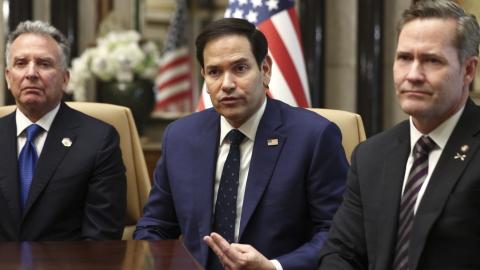A Year of War Crimes and Devastation: Russia's Invasion of Ukraine and What Comes Next
KYIV, Ukraine – One year ago, satellite data along the borders of Ukraine showed the largest Russian military buildup since the Cold War. U.S. intelligence warned about an oncoming invasion in late February, and thus began the biggest land war since World War II.
The last year has been a nightmare for the Ukrainian people. CBN News has been reporting from the conflict zone throughout much the war, which allows us to brings you this unique reflection from Kyiv.
On February 24, 2022, life as Ukrainians knew it comes to an end – Russia's authoritarian ruler Vladimir Putin launches a full-scale invasion by land, sea and air. Russian troops pour into Ukraine.
World leaders immediately sanction Russia. "The Russian Military has begun a brutal assault on the people of Ukraine. Without provocation, without justification, without necessity. This is a pre-meditated attack," President Joe Biden said.
More than 70,000 Russian troops try to encircle the capital, Kyiv. But the advance quickly bogs down. Russian troops are poorly trained, led, equipped and very poorly motivated. They encounter fierce resistance.
Ukrainians fight back, using whatever they can get their hands on, including taking the sand from the playground to make sandbags.
Pastor Gennady Mochyenko says Russia must be pushed back now or their aggressive behavior will only resume down the road. "If we don't stop them now, my grandchildren must fight them maybe twenty years later. We must stop this," Mochyenko said.
Putin's invasion bogs down in late spring, Russia resorts to long-range missile strikes, causing thousands of civilian casualties and billions in property damage. Hospitals, homes and schools are often the targets.
By April, it is clear the Ukrainians will hold Kyiv, and Russia pulls back to refocus their combat power in the east. After the withdrawal, liberated areas reveal horrific Russian war crimes and human rights abuses.
Russia captures Mariupol in May after four months of costly fighting. Thousands die in the fighting, and the city is reduced to ruin.
As Russian cruise missiles, cluster munitions, and thermobaric weapons fall, Ukrainian farmers cannot ship their grain to market, causing a new humanitarian crisis. Wheat supplies plummet, causing a global shortage.
Concerns about fighting at the Zaporizhzhia nuclear power plant dominate the summer airwaves as Russia holds the facility hostage in a risky move, endangering the plant's employees.
Rafael Grossi, director general of the International Atomic Energy Agency says, "What's at stake is the nuclear safety and security of the biggest nuclear power plant in the European continent."
***Please sign up for CBN Newsletters and download the CBN News app to ensure you keep receiving the latest news from a distinctly Christian perspective.***
Ukraine launches a counteroffensive in September. They quickly liberate over 600,000 square kilometers in the North, and soldiers say donated American equipment makes the difference.
Ukrainian Airborne Trooper Alex Mochanov says, "One of our soldiers with the technology is stronger than maybe than 10 or 20 soldiers from Russia. It helps us to win."
Suffering heavy losses, Putin orders the first military mobilization since World War II. More than a million Russian men flee to avoid conscription.
In September, Russia "annexes" Luhansk, Donetsk, Kherson, and Zaporizhzhia. The Crimean bridge is bombed days later. Soon afterward, the Ukrainian army retakes Kherson, handing the Russians their worst defeat yet and sparking street celebrations.
Russia targets critical infrastructure as winter approaches, using the cold as a weapon. Daily rocket attacks leave many Ukrainian villages without electricity, water, or heat. Battle lines harden as President Zelenskyy requests more aid, because his army is firing more artillery in a month than most countries acquire in a year.
Operation Blessing and Orphan's Promise have been assisting Ukrainian Christians and other suffering citizens since the beginning, providing desperately needed help to frontline areas and displaced families across Ukraine.
"It's like they are fighting for me too. It's another level of soldiers," Olga says.

One year after the invasion, Russia has yet to realize any of its strategic goals, and escalation seems increasingly likely as NATO deploys more troops to their eastern border. A new Russian offensive with up to 500,000 troops hopes to defeat the Ukrainians before they can utilize promised tanks and long-range weaponry. But Ukraine now has a million-man army and is better prepared and equipped.
Experts now say the war could last years, but whether Ukraine gets the weapons it needs in the next few months could make all the difference.



